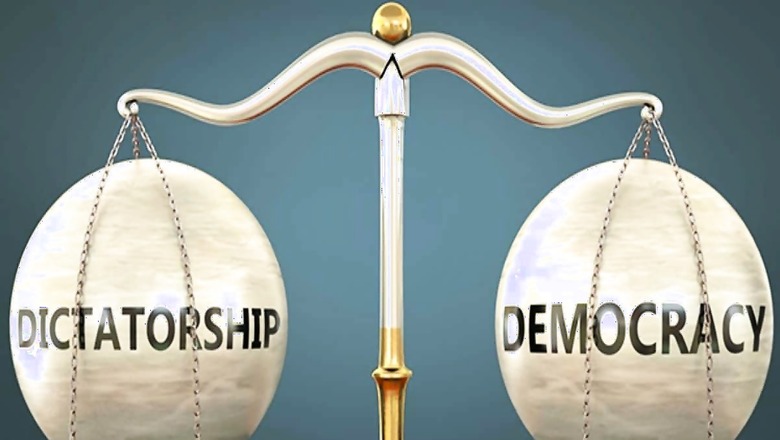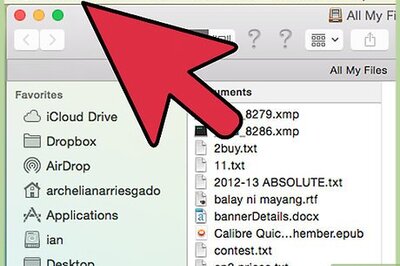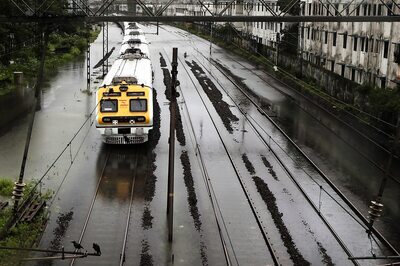
views
Dhruv Rathee’s two recent videos on the supposed “dictatorship” in India have gone viral on YouTube. Together, they have gathered over 40 million views. Most of those people will never be able to take him on with the right questions. How can you say that India is a dictatorship? To be fair, Dhruv Rathee never said that. He only said that India is on the way to becoming one.
But what does that even mean? If you leave Delhi and drive one mile out west, you are technically somewhere on the way to London. So unless you let us compare India’s democracy to other countries, you have told us nothing on whether India is becoming a dictatorship. So let’s compare our democracy to Germany.
Why Germany? For one, Dhruv Rathee is based there and must know something about the country. His 17 million strong base of YouTube subscribers, mostly Indians, deserve to know as well. In any case, Germany gets excellent ratings from the supposed international experts on press freedom and democracy. Also, the other day, the German government began commenting on our internal affairs, totally uninvited. So let’s turn it around.
On social media in India, an argument between two sides might go something like this – Farmers in Germany are protesting too. They have come out on the streets with tractors. Why is there no outpouring of support from international publications such as The New York Times or The Washington Post? Do they report only on protests in India? In Western countries, do they not have folks like say, Dhruv Rathee, who will speak truth to power?
Maybe not, a thoughtful Indian liberal would reply. But those countries also do not have “godi media.” And nobody in Germany called the protesting farmers “anti-national.” So, checkmate!
Except that is exactly what the German establishment, the media and the political class did. In fact, they did much worse. They accused the farmer protesters of being Nazis. In Germany, the ruling government even spies legally on the phones of the Opposition. The head of the German spy agency issued an official statement directing Germans on how to vote. Imagine the outcry if the Intelligence Bureau here in India did something even close to that. But in Germany, it happens all the time.
Germany is also a country where the police pulled out a 16-year-old girl from school to question her over a post on TikTok that appeared to support an Opposition party.
But we Indians were not supposed to know all this. We were just supposed to assume that Western countries are better in every way. Their newspapers judge us and push their narratives, yet we remain largely uninformed about their domestic politics.
German government and media demonised farmer protesters
Earlier this year, farmers in Germany feared that their subsidies would be taken away. So they decided to protest. They brought their tractors out on the street and blocked traffic. Sounds familiar?
So how did the German government deal with the protest? The Vice-Chancellor was the first to react. He had been on an island holiday when he was confronted by protesters. He lost his temper and accused the protesters of being extremists who were out to uproot democracy. A week later, Chancellor Olaf Scholz said the same thing. The obedient German media took it from there. The leading Frankfurter Allgemeine newspaper ran a headline that translates to “pampered farmers,” bashing their subsidies and sense of entitlement. The BBC went a step further and published a long article claiming that the protests had been infiltrated by neo-Nazi groups. Incidentally, John Reith, the founder of the BBC, was himself a Nazi sympathizer. But that is a story for another day.
These were not just empty words from the government and media establishment. A month later, the government announced a 13-point plan aimed at countering the protesters. This plan included measures such as seizing the bank accounts of the protesters. Additionally, individuals who donated to the protest movement were to be identified and subjected to investigation. “Those who mock the state must be ready to face a strong state,” Germany’s interior minister announced.
This demonisation of working-class protesters is not limited to Germany. The same happened to truckers protesting in Canada in 2022.
What kind of threat did the Canadian government identify then? As a ruling Liberal Party MP explained in Parliament, the truckers had been sounding their horns. Or in other words, honking. He pointed out that repeating the word “honk” results in “Honk Honk,” which can be abbreviated to “HH”. According to him, “HH” could stand for “Heil Hitler”. This is the quality of evidence on the basis of which Canada concluded that the protesters were all Nazis, and imposed national emergency. The global media played along, of course.
You must be wondering, but what about elections? Are politicians in Germany not worried about angry voters on the streets? As we shall see later, they do not need to. Because of a very special provision in German law that stops new parties from winning seats.
Imposing Christianity
Is Germany officially secular? Of course, it is. But there is an easy way around it. Germany imposes Christianity simply by calling it “culture” in place of “religion.” For instance, the German state of Bavaria requires that the Christian cross be displayed prominently in every government building. The trick has been tested repeatedly in court and it works just fine. In fact, the courts themselves have to display the Christian cross. And public schools as well. Incidentally, the same legal trick is also used in Italy to display the cross in public schools. As a symbol of “culture,” not “religion.” By the way, whose idea was it originally to put the cross in Italian public schools? That would be Benito Mussolini. But that is apparently not a red flag for experts who look out for signs of dictatorship.
Believe it or not, the Church is the second largest employer in Germany, after the government itself. The Church employs over a million people directly. And millions more look up to the Church for moral guidance. This gives the Church immense lobbying power with politicians.
This shows even in the names of the political parties. The Christian Democratic Union (CDU) has been the most dominant party in Germany since the Second World War, along with its ally the Christian Social Union (CSU). The Church even collects its own taxes. Again, this power comes directly from a 1933 agreement between the Vatican and Adolf Hitler, which is still in force. Another name that is not a concern for experts who compile the democracy rankings.
Germany’s Continued Embrace of Politicians with Nazi Connections
Perhaps no discussion on Germany and dictatorship can be complete without looking into the country’s Nazi past. The Christian Democratic Union (CDU) is descended directly from the Catholic Center Party of Konrad Adenauer, which existed before the war. It is this catholic party whose votes gave the Nazis a two-thirds majority needed to pass the 1933 constitutional amendment that made Hitler dictator.
In fact, Adenauer himself had been briefly arrested by the Nazis in 1934. But then he wrote a letter to the government detailing all the favours he had done for the Nazi Party as a public official in the city of Cologne. Should we call that a “mercy petition?” In any case, the Nazis released him and granted him a pension, with which Adenauer built himself a nice home in the south of the country.
But that never hurt Adenauer’s political career. After the war, Adenauer was elected Chancellor of Germany, and he led the country from 1949 to 1963. As Chancellor, he ended the denazification process and released from jail thousands of Nazis who had been convicted of crimes against humanity. Today, Adenauer is recognised as one of the founding fathers of the European Union. A glowing profile of him on the official website of the European Parliament even refers to the embarrassing pension incident. But that is cited as one of his “struggles” against Nazism! A struggle for what, exactly? Getting a comfortable family home under Nazi patronage?
But when you are white, Christian and powerful, historians tend to look at you very differently.
As if that was not enough, there is Hans Globke. As a senior Nazi official, he had worked on the infamous Nuremberg race laws for the exclusion of Jews. He had even been part of the “Office of Jewish Affairs” under the Nazi regime. But after the war, he served under Adenauer’s administration as secretary of state. You must have heard of Nazi propaganda minister Joseph Goebbels and his radio broadcasts against Jews. Those were prepared with the help of Kurt Kiesinger, who went on to become Chancellor of Germany in 1966.
These are not isolated examples. Across the “free world,” several Nazis went on to make glowing careers for themselves. During the war, Kurt Waldheim was a Nazi intelligence officer in Greece and Yugoslavia. He went on to become Secretary General of the United Nations and was later elected President of Austria. Prince Bernard of the Netherlands had been a card-carrying member of the Nazi SS. He continued in his royal position until his death in 2004.
The dirty truth is that much of the Western world had few problems embracing actual Nazis and fascists after the war. At various stages, many legendary Western leaders have openly expressed their admiration either for Hitler or Mussolini. The list includes Winston Churchill, Pierre Trudeau and even John F Kennedy. It even includes celebrated thinkers like George Bernard Shaw and authors such as P G Wodehouse. Tell this to the average Indian liberal who thinks they can win every argument by connecting the RSS to fascism. Who is “WhatsApp University” now?
Germany is an “electoral autocracy”
Beyond the Christian Democratic Union (CDU), the other major political party in Germany is the Socialist Party (SPD). But here is where it gets crazy. The two biggest parties are almost always in alliance, ruling in a coalition government. From an Indian perspective, that would be like a BJP-Congress alliance in power. So there is basically no Opposition party in Germany. Angela Merkel, who ruled Germany for four terms, was from the CDU. But in three of those terms, she ruled jointly with her main “Opposition.” The current Chancellor Olaf Scholz is from the SPD. He used to be Merkel’s deputy in her previous CDU-SPD coalition government. So in the latest 2021 elections, was the ruling party thrown out of power, or voted back to power? It is impossible to say.
But what if a new party emerges to challenge these two ruling parties? To win even a single seat in Parliament, a party must get at least 5 per cent of the popular vote. That would be quite difficult. Remember that in India, there are just two parties, the BJP and the Congress, that win more than 5 per cent of the votes. This also means that in Germany, existing political parties cannot split. Because if a faction falls below 5 per cent of the popular vote, it would be down to zero seats. Also, independents cannot emerge.
Remember when we said that political parties in Germany have no reason to fear the voters? This is what “electoral autocracy” looks like.
And once people have voted, there is the question of deciding which party gets how many seats. This is done as per complicated formulas such as the “Hare-Niemeyer method” or the “Sainte Lague-Schepers method.” And they keep changing the formula every ten years or so. Also, there are “overhang seats” and “levelling seats” that can be added or subtracted to Parliament as per other formulas. There is no way the average voter can keep track of this. The confusion means that a permanent political class stays in power.
In recent years, a new political party called the Alternative for Germany (AfD), has managed to break through the system. It got 10 per cent votes in the last election. Opinion polls now show them getting above 20 per cent. Now the existing political parties say they want to ban the AfD. Or at least, ban all funding to it. Apparently, that is both possible and legal. And somehow, it is not a danger to democracy.
How is India less democratic than Germany?
We are aware that this article breaks a number of unwritten rules. For one, we Indians are not supposed to have strong opinions about domestic matters of foreign countries. The Western media give only themselves that privilege, that of judging others on their internal affairs. But that is just a mental block. We can overcome it.
We are also aware that liberals will accuse us of “whataboutery.” Once upon a time, hypocrisy used to be a terrible thing. But now exposing hypocrisy is considered much worse. In any case, they started it with those silly democracy rankings. Should we Indians not respond?
And when they make those rankings, they make sure to place India below Qatar or North Korea in things such as the safety of journalists, or press freedom. It is a clever strategy to keep us on the defensive. Because when we see this, the temptation is to respond: how are we worse than Qatar or North Korea?
But of course, we have more press freedom than Qatar or North Korea. That goes without saying. By trolling us with these outrageously low rankings, they make sure that we do not challenge the West directly. How are we less democratic than Germany or America? Show us. That is the question we should be asking them.
We Indians need to respond. Because the reputation of our country is now under attack. Both from the inside and the outside. Both make use of the fact that Indians do not talk much about political systems outside India. But if we Indians followed politics in other countries, those who say democracy is in danger in India would have nowhere to hide.
Abhishek Banerjee (@AbhishBanerj on “X”) is an author and columnist; Karuna Gopal (@KarunaGopal1 on “X”) is President, Foundation for Futuristic Cities. Views expressed in the above piece are personal and solely those of the author. They do not necessarily reflect News18’s views.




















Comments
0 comment